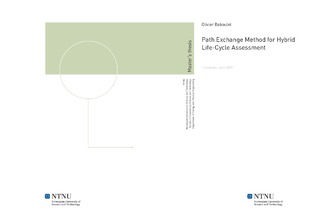Path Exchange Method for Hybrid Life-Cycle Assessment
Master thesis
Permanent lenke
http://hdl.handle.net/11250/233674Utgivelsesdato
2009Metadata
Vis full innførselSamlinger
Sammendrag
To keep process-specificity while extending system boundaries hybrid techniques were developed allowing the micro structure of the important parts of a system to be revealed at the same time the entire economic system in which the system is embedded to be covered. Despite the substantial improvements bestowed by hybrid techniques some downsides still hold. Tiered hybrid LCA first does not model feedbacks whereas the relationship between the process-based system and the input-output based system is interactive and second it may suffer from double counting incidents as a process may be instigated in both the IO and LCI data. Integrated hybrid LCA overcomes those aforementioned pitfalls but only at a price of high labor and data intensity. This work aims to elaborate a new hybridisation method that avoids previously mentioned drawbacks. This technique is designed to not operate anymore at the matrix level as is the case for current hybridisation techniques but at the structural path level, per se the finest level of detail possible for the disaggregation of the Leontief inverse, and as such an ad hoc basis to carry out an hybrid analysis. It is argued that the method presented here constitutes a culmination amongst hybridization techniques. Its operability and capabilities are demonstrated before an interpretation from an input-output vantage point is carried out on a case-study not to be found in the literature, a comparison across the faculties of a university.
